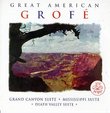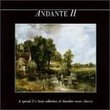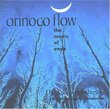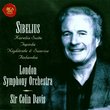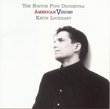| All Artists: Virgil Thomson, Ned Rorem, William Schuman, Howard Hanson, Gunther Schuller, Edward MacDowell, Siegfried Landau, Maurice de Abravanel, Donald Johanos Title: American Orchestral Music Members Wishing: 0 Total Copies: 0 Label: Vox (Classical) Original Release Date: 1/1/2000 Re-Release Date: 9/6/1994 Genres: Soundtracks, Classical Styles: Historical Periods, Modern, 20th, & 21st Century, Symphonies Number of Discs: 2 SwapaCD Credits: 2 UPC: 047163509223 |
Search - Virgil Thomson, Ned Rorem, William Schuman :: American Orchestral Music
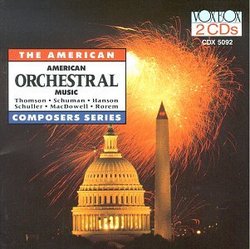 | Virgil Thomson, Ned Rorem, William Schuman American Orchestral Music Genres: Soundtracks, Classical
This is a giant collection of some of the best American symphonic work of this century. These are analog transfers from old mid-priced Turnabout recordings of the sixties and seventies and the folks at Voxbox should be c... more » |
Larger Image |
CD DetailsSynopsis
Amazon.com This is a giant collection of some of the best American symphonic work of this century. These are analog transfers from old mid-priced Turnabout recordings of the sixties and seventies and the folks at Voxbox should be congratulated for their engineering skills. These are excellent reproductions. The Rorem Symphony 3 is the one work here that should have more currency. It is a delightful update of the kind of symphony that was produced in the 1930s, except you can hear intimations of jazz and Broadway melodies at work. This is a major collection no library of American music should be without. --Paul Cook Similarly Requested CDs
|
CD ReviewsThe Cracker Jack and the Prize, too. Ypres1918 | Western Pennsylvania, USA | 06/12/2002 (5 out of 5 stars) "5 stars, though the Virgil Thompson piece is outright banal. But here's the payoff:The higher points on this set are Schuman 7th, the Schuller Symphony 1965, and to a much lesser extent, the Hanson. These works alone make this a super buy, but then there's the Rorem 3rd. Zounds! Why this work has never gotten wider circulation is beyond me. It's thoroughly tonal, and far from being a challenging listen, but in every way satisfying in a modern sense. It turns out to be a pure delight, even for hardened listeners of 20th Century fair, while yet appealing to those whose 20th Century exposure is limited.Were the Schuman and Schuller missing, this set would be worth having just for the Rorem. Were the Rorem missing, it would be worth having for the Schuman and Schuller. Altogether, then, this is one of the better buys in 20th Century American Classical Music. Don't put off buying this disc another second." Rare stuff (more then than now), and some of it valuable Discophage | France | 05/05/2007 (4 out of 5 stars) "In the days of the LP, Vox/Turnabout did great service to the music lover by issuing a lot of rare material, both in the Romantic repertoire (numerous "complete" sets) and in the realm of modern and contemporary music, usually played by second-rate ensembles - but that was and still is infinitely better than nothing. In the early 90s they tapped into their inventory and reissued, among others, nicely conceived collections of American music, including this one. These CD reissues gave us the chance to hear these works and recordings anew, unblemished by the inferior and noisy pressings that more often than not marred the original LPs.
Perforce this cross-section of American orchestral compositions written between 1895 (MacDowell) and 1967 (Hanson) is entirely arbitrary, but let us welcome what we get, as it offers material rarely recorded otherwise. The recordings were originally released in 1971 (Schuller and Schuman) and '73 and four of them are actually first recordings (Rorem and Hanson in addition to the two above-mentioned). Since then Gerard Schwarz has done the modern recording of Hanson's symphonies on Delos, Maazel has recorded Schuman's 7th for New World and Hyperion has released a recording of Thomson's Louisiana Story-suite along with the second suite, "Acadian Dances", from the same film music; likewise Naxos has issued recordings of Rorem's first three symphonies and of MacDowell's Suites in their valuable American Classics Series, and this website in fact lists a number of other recordings of the MacDowell. So to the best of my knowledge only Schuller's symphony hasn't been recorded again. MacDowell's Indian Suite is a not very interesting rehash of sub-par Liszt anyway (or rather sub-par Raff, to make matters worse). Whatever original Indian flavour there may have been in the original tunes is entirely lost in the process. The only incredible thing is how MacDowell could write that kind of bombastic film music before the invention of film. Thomson's Louisiana Story-suite is indeed film music, written for a 1948 documentary by the great Robert Flaherty; the music is impressionistic and could have been written by Charles Loeffler. The best is the passacaglia and grandiose fugue that ends the suite. Hanson's 6th Symphony was written in 1967. If you forget its date of composition it is very enjoyable. Indeed, though written three years after Schuller's, its language dates from twenty years earlier. It has the rhythmic vigor and dramatic sweep of the American symphonies composed in the 40s and the same kind of wistful slow movements. Its formal architecture is original, with a succession of slow-fast-slow-fast-slow-fast movements. It is not better but not worse than the best among similar works composed in those War and post-War years by Barber, Copland, Harris, Piston or Mennin. Rorem's Third Symphony from 1959 is for me a slight disappointment. Rorem is an estimable composer and a not minor figure in the American musical life. But his symphony strives too much for the facile effect, with its grandiose and coplandesque opening peroration on a four-note motif followed by a slow, than pastoral unfolding of the same, its jazzy second movement (Copland had tried that in his 1922 piano concerto, and then dropped the notion; Bernstein picked it up, and wasn't very convincing at it), its alternately wistful and assertive slow movements (third and fourth) full again of coplandesque overtones, and its scurrying, triumphantly bombastic finale. I hear nothing new nor very personal here. The Symphony 1965 of Gunther Schuller (it was actually completed in '64) provides a welcome contrast. Now be warned and be prepared: this is a serial (e.g. twelve-tone) symphony. It music language is post-late Schoenberg - the more radical Schoenberg of the Variations opus 31 and Violin Concerto. It is not easy listening, but its rewards are many, as it is full of musical "events" that constantly engage the listener's attention. Hearing Schuller's Symphony, I feel like reversing the cliché that anybody can write serial music, but that it takes a REAL composer to write a tune. Well, I've been hearing twenties of symphonies composed in the 40s by the Barbers, Pistons, Schumans, Harrises, Mennins and the likes and, whatever their merits, ultimately they all sound as much the same as Haydn sounds like Mozart. Based on them I'd say that anybody can write a tune, and has (that is the least a composer can do) - but devising a cogently argued serial symphony, now THAT takes a real composer. Schuman's 7th (written in 1960) is very typical of its composer, if not the most original of his symphonic utterances (the 3rd and 8th are more unpredictable and thus more interesting). I have reviewed Maazel's recording on New World (William Schuman: Symphony No. 7; Leonardo Balada: Steel Symphony) but haven't done a close comparison of his and Abravanel's readings. Maazel has Leonardo Balada's exciting "Steel Symphony" as a complement, but a skimpy timing. The very informative notes (including Schuller's own very thorough presentation notes for the Symphony's premiere) are part of this set's value. " |

 Track Listings (12) - Disc #1
Track Listings (12) - Disc #1